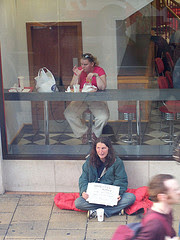As one would expect, people being people, several of them went out of their way to bring the less than complimentary article in the February 22 2007 UCFV Cascade about the Salvation Army to my attention. They seemed very disappointed by my reaction “The future of journalism is sooooooo dim!!”
Ironically the February 26th edition of the somethingcoolnews.ca would contain an article by me on the terrible reporting I saw on Global’s Noon Hour News. This was not the first piece/letter to the editor I have written on this topic and given the flood of just plain BAD journalism these days it will be far from the last – as evidenced by this piece.
Those who have witnessed my reaction know that I find the fact we are being inundated with shoddy, deficient reporting at a time and on topics were full, accurate public knowledge is needed in order to make intelligent decisions extremely aggravating and very, very frustrating. A public constantly misinformed by the media presents an educational challenge that must be overcome before we can begin to address our society’s problems. Another layer, another barrier added to beginning to solve complex pressing social problems such as homelessness, addiction and poverty. This deluge of outright terrible journalism is adding to the problem at a time we desperately need accurate, thoughtful and insightful journalism to give people facts and a true picture of the state of affairs.
So I write to the reporters and editors to express my thoughts not so much because I expect them to change (although one can always hope) but to relieve my frustration and because if we, the victims of this inferior journalism, do not protest we surrender all hope for decent reporting. I really have no expectations of reply or that they will publish these critiques, but then with the internet there are venues to share it with the public and faithful readers. I must acknowledge that the Abbotsford – Mission Post did publish my letter to them – unedited and in its long entirety. Based on reading it weekly the post seems to be trying to live up to its rather lofty stated Editorial Policies.
Unfortunately for readers and those who pay for the publication the UCFV Cascade seems to have no such lofty editorial standards or policies. From Ms Bois article it would appear their requirements are a) it fill the blank space on the page; b) it permit the abuse of one of the target’s print ads to fill an even bigger blank space on the page and c) it permit the placing of a flashy, eye-catching “expose” insert on the front page in a desperate bid to “move the paper off the strand’. Just as an aside vis-à-vis the “expose” it would appear that either the Cascade lacks a dictionary or perhaps just anyone capable of using a dictionary.
Personally, if I had been editor the space would have remained empty with the caption: “Our apologies, the article scheduled for this space was unfit to print”.
For obvious reasons of common sense there is a policy of no dogs on the property, especially necessary in light of a cliental under the influence of behaviour changing substances. Ms Bois may choose to argue that the dog is “a nice gentle animal”. This is the type of quote that hacks in commercial, “if it bleeds it leads” journalism always hunt someone down to say after a child has been savaged by said “nice doggy”. With the state of journalism these days if you cannot attack your target for causing a vicious dog attack, you can always criticize their anti-dog policy.
Unfair but then fairness was notably absent from this article. Fairness would have required that she make it clear that the whiner was not refused food as implied, but was given hearty soup, bread, dessert and pretty much a bottomless cup of coffee. Several times a week there is a meal provided for a $1, giving those on very limited budgets a chance to purchase a change from soup. In fairness to everyone, if you choose to spend your money on other things than the meal you get soup.
When personally lacking the dollar, through my own choices, I never felt/feel slighted, it was and is fair. Fairness also causes me to sympathize with the volunteers if, after 20 people have spent several minutes each arguing they are so special the rules apply to everyone but them and then cursing them as terrible human beings when they enforce the rules, if a volunteer gets a little snippy. In fact I often find myself apologizing for the oaf’s behaviour and thanking them for volunteering since I appreciate that without the volunteers the meals, the café and many other services could not function. They voluntarily give their time and far too often I am left wondering just how crazy they are to continue to volunteer given how often they are verbally abused by clients.
They are human beings and so yes politeness, asking instead of demanding, please, thank you and just plain good manners can result in them preferring to help, even go out of their way to help, a person demonstrating basic civility over a person screaming obscenities in their face while demanding T-bone steak for dinner, that their every demand be immediately met and asserting that they are the point around which the Universe must revolve. Karma: good behaviour is rewarded, bad behaviour has a cost. Excuse me if I do not find this Balance upsetting.
Although, considering Ms Bois contacted her target just before the Cascade’s deadline expecting them to drop everything and meet her needs NOW, she may not even find “the universe revolves around me” attitude anything but normal behaviour. No, blithely tossing off “Unfortunately my attempts to arrange … did not succeed” is not acceptable journalism when it a) involves a deadline that is for the writers convenience and is unrealistically short and b) there is no reason to rush the story into print.
But then this attack was not about being balanced. If it was Ms Bois would not be demanding special treatment for some (exemption from the dog ban, accepting 75 cents for $1 meal) while taking away the rights of others (the right not to be bitten by a dog or even having to worry about that; that everyone pays the $1 you did for your meal) and then a few paragraphs latter accusing the target of giving special treatment to some. Either argue for or against special treatment but be consistent and include an explanation for why the special treatment. I for one would be interested to know upon what basis Ms Bois thinks it equitable or ethical treatment to charge those who spend their money on things other than the meal less than those who save up to treat themselves to the meal as opposed to the plainer soup that everyone can have.
I do concede that Ms Bois was very consistent in whom she spoke with, searching out those who have a bone(s) to pick or conflict with the target organization of the article and avoiding anyone with positive experiences or things to say. This kind of unbalanced, negative research is what spreads misinformation and establishes stereotypes such as all homeless are lazy drug using bums. The lack of balance and its focus on the negative also leads to the kinds of gross factual errors the article contained.
Perhaps it was simply laziness that prevented a simple google search or a search of local newspaper articles would have turned up: a) reports on the extreme weather plan, resulting in the shelter stuffed to overflowing b) articles and letters about how full the shelter is and the large number of people turned away because the shelter was already not only full but overfull.
Even simpler would have been a little footwork. It is not as though the target organization is clandestine or hard to find. Giving the writer access to the best evidence of all, personal observation. Drop in and observe, better yet volunteer to see just what they face day-in and day-out. Of course this course of action would have entailed the high risk of meeting those who have good things to say or seeing some of the truths staff and volunteers see, face and deal with daily.
Perhaps it would seem that basing a judgement on the future of journalism on this one article is against common sense, unfair and unbalanced – but entirely in keeping with Ms Bois reporting. Sigh. The future of journalism is so dismal. I should have expected something along these lines after all, to adapt from the Tao of James, “When you think you have reached rock bottom journalistically with articles that were unfit to see the light of day, someone will write an article to prove you wrong.”
 Usually lunch is available Sundays and Mondays, but with hunger on Holiday the fellowship of the organizations that had taken responsibility for serving lunch on those days joined hunger on Holiday.
Usually lunch is available Sundays and Mondays, but with hunger on Holiday the fellowship of the organizations that had taken responsibility for serving lunch on those days joined hunger on Holiday.
